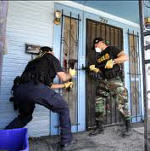

Cuomo strikes back at gun rights lawsuit
![]()
By Raquel Okyay, June 30th 2013
Article source
 The Empire State governor seeks dismissal of complaint filed by the state's largest firearm association which alleges that the New York Secure Ammunition Firearms Enforcement Act of 2013 is unconstitutional.
The Empire State governor seeks dismissal of complaint filed by the state's largest firearm association which alleges that the New York Secure Ammunition Firearms Enforcement Act of 2013 is unconstitutional.
"The state filed a motion for a preliminary injunction, a dismissal, and for summary judgment," said Stephen P. Halbrook PhD, a Second Amendment legal scholar and lead counsel for plaintiff in the matter of New York State Rifle and Pistol Association, et al. v. Andrew M. Cuomo, Governor of the State of New York, et al.
As far as arguments in defense of the new law, he said the state's 93-page response does not substantively say much. "I cannot predict the outcome, but we are confident in our arguments."
When using the Heller test, the gun rights author said that law-abiding people, having firearms for lawful purposes are protected. "We can prove that the firearms banned in the law are commonly and lawfully possessed."
In the 2008 District of Columbia v. Heller landmark case, the U.S. Supreme Court held that the Second Amendment to the U.S. Constitution protects an individual's right to possess a firearm for traditionally lawful purposes.
 The state's motion says that assault weapons are unusually dangerous military-style firearms and are not in common use. It also alleges that New York's bans on assault weapons do not even implicate plaintiffs' Second Amendment rights, because such weapons are not within the scope of the Second Amendment.
The state's motion says that assault weapons are unusually dangerous military-style firearms and are not in common use. It also alleges that New York's bans on assault weapons do not even implicate plaintiffs' Second Amendment rights, because such weapons are not within the scope of the Second Amendment.
Yet, the firearms that are banned in the law are mostly for common use such as hunting, sport, and self defense, said Halbrook whose work has been cited as an authority in numerous court cases. "Currently, the term assault weapon can mean anything the state legislature wants it to mean."
The firearms that are being designated assault or military-type weapons have nothing to do with the original meaning, he said. "The main feature of a military-type weapon is a fully automatic that keeps firing."
"None of the semi-automatic firearms banned do that," he said. A semi-automatic firearm does not automatically fire an additional round until the trigger is released and re-pressed by the person firing the weapon.
"Features such as stock shape, pistol grip, and adjustable shoulder strap are not sufficient reasons for designating a firearm an assault weapon," said Halbrook, who was the prevailing counselor in four reported cases before the U.S. Supreme Court.
"They are using the term as a propaganda tool," he said."The state's response is exactly what I expected," said Thomas H. King, president of the New York State Rifle & Pistol Association. NYSRPA is the nation's oldest firearms advocacy organization.
"It is a compilation of events and arguments made by anti-gunners over the past 15 years," he said. "We have 30 days to respond."
The lawsuit which is pending before Judge William M. Skretny in the U.S. District Court, Western District of New York, has a hearing scheduled for Aug. 23, he said.
"Ultimately, I believe we will be successful," he said.
 "We have very legitimate claims," he said. "The SAFE Act was ill-conceived, and never researched or properly thought-out."
"We have very legitimate claims," he said. "The SAFE Act was ill-conceived, and never researched or properly thought-out."
"Any scholar can look at our issues, and see how significant they are," said King, who is also a National Rifle Association board member.
"We are entering uncharted waters and a period of extreme danger," said New York State Assemblyman William R. Nojay (R. – Pittsford), who is the sole assembly member to be named a plaintiff in the federal lawsuit.
The most offensive provisions of the SAFE Act are the registration requirements for currently owned firearms and the outright prohibition on new purchases of firearms incorrectly defined as assault weapons, he said. "Not since Prohibition has a law been passed which has so little prospect of being observed by ordinary citizens."
Prohibition refers to the legal act of prohibiting the manufacture, transportation and sale of alcohol. In 1919 prohibition was instituted in the United States by and amendment to the Constitution and in 1933, the amendment was repealed.
The SAFE Act has created an unnecessary timeline toward confrontation between law enforcement and American citizens, said Nojay, an attorney and radio host. "It is tragic and will have consequences far beyond what those responsible for the law could have imagined."
 Registration is one step away from confiscation, he said. "Cuomo has already used the 'c' word in a radio interview when he said confiscation may be necessary some day."
Registration is one step away from confiscation, he said. "Cuomo has already used the 'c' word in a radio interview when he said confiscation may be necessary some day."
"Cuomo has tipped his hat to the long-term goals of the anti-Second Amendment crowd," he said.
The worst part of the SAFE Act is that it will have no impact on preventing violent crime, nor will it alter the prospects of tragic occurrences such as in Aurora, Colo., or Newtown, Conn., he said.
Even the Obama administration said that the mental health provisions are so inherently flawed, it has refused to allow the Veterans Administration to comply, Nojay said. "When the president says we have gone too far with gun control, you would think the governor would listen."
![]()




































